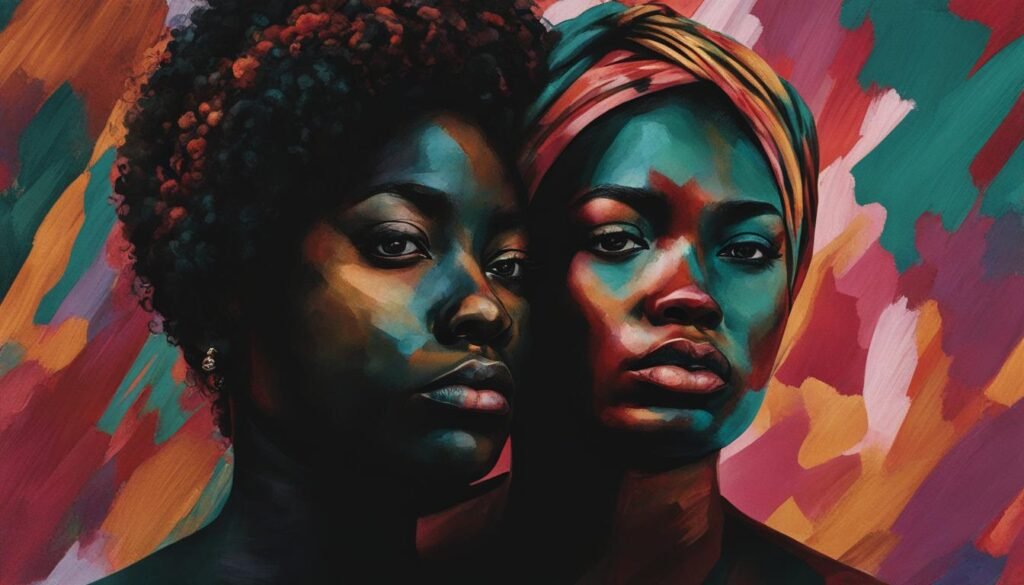What is Black Mental Health Matters?
Black Mental Health Matters is a crucial movement focused on improving mental wellness within the Black community. With the aim of raising awareness and addressing mental health disparities, this initiative highlights the importance of mental health awareness in the black community.
The COVID-19 pandemic and its associated challenges have disproportionately impacted Black communities. Studies have shown that Black individuals are more likely to experience serious psychological distress. However, they are less likely to seek mental health treatment compared to their white counterparts. This gap in mental health support further emphasizes the need for initiatives like Black Mental Health Matters to promote mental health in the black community.
Key Takeaways:
- Black Mental Health Matters is a movement focused on improving mental wellness in the Black community.
- Mental health disparities exist in the black community, with Black individuals being less likely to seek mental health treatment.
- The COVID-19 pandemic has highlighted the importance of mental health awareness in the black community.
- Black Mental Health Matters aims to raise awareness and address mental health disparities.
- Improving mental health in the black community requires understanding and breaking down barriers and stigmas.
+
Resources for Black Mental Health
When it comes to supporting Black mental health, there are numerous resources available that cater specifically to the needs of the Black community. These resources play a crucial role in promoting mental wellness, raising awareness, and providing essential information and support. Some of the notable resources include:
Social Media Accounts
- Black Male Mental Health
- Black Mental Health Alliance
- Melanin & Mental Health
These Instagram and Twitter accounts foster a safe and inclusive space for individuals to share their stories, experiences, and perspectives related to mental health. They also provide valuable information and guidance.
Websites
- Black Mental Wellness
- Therapy for Black Girls
- Therapy for Black Men
These websites offer evidence-based resources, articles, and directories of Black therapists who understand the cultural nuances and challenges faced by the Black community.
Organizations
- Black Emotional and Mental Health Collective (BEAM)
- African American Behavioral Health Center of Excellence (AABH CoE)
BEAM and AABH CoE are dedicated organizations working towards removing barriers and improving access to mental health care for Black individuals. They advocate for change, address systemic issues, and promote mental wellness initiatives.
These resources provide a valuable support network for Black individuals seeking mental health resources, advocacy, and wellness. They strive to bridge the gap in mental health disparities and enhance the overall well-being of the Black community.
The Impact of Stigma and Barriers
Stigma and barriers significantly contribute to the mental health disparities faced by the Black community. The hesitation of many Black individuals to seek mental health care is driven by the pervasive stigma surrounding mental illness, a lack of trust in the mental health system, and the mislabeling of their concerns. These barriers prevent individuals from accessing the critical support they need to safeguard their mental well-being.
Financial constraints also play a role, as many Black individuals lack the resources necessary to access quality mental health care. Additionally, a lack of culturally responsive care further exacerbates the disparities. The healthcare system often fails to adequately address the unique needs and experiences of the Black community, resulting in limited access to appropriate treatment options and support.
Historical and cultural factors, including the legacy of slavery and racism, have contributed to a culture that ignores mental illness or describes it in different terms, such as stress. The impact of intergenerational trauma, passed down through generations, further compounds the mental health challenges faced by Black individuals.
Overcoming stigma and addressing these barriers is crucial in improving black mental health. By promoting mental health awareness, implementing culturally sensitive care practices, and increasing access to mental health resources, we can begin to bridge the disparities and ensure that black mental health receives the attention and support it deserves.

Highlighted Quote:
“Addressing mental health disparities and promoting mental health awareness in the black community is of utmost importance.”
The Impact of Racism and Trauma
Racism and trauma have a profound impact on the mental health of Black Americans. The historical and ongoing experiences of racism, discrimination, and trauma contribute to higher rates of mental health conditions among Black individuals. Racial trauma, which can result from direct experiences of racism or indirect stressors, has significant effects on mental well-being. Intergenerational trauma, passed down through generations, also plays a role. Systemic racism, reduced access to healthcare and resources, microaggressions, and disparities in social determinants of health all contribute to the mental health challenges faced by the Black community.
| Impact of Racism and Trauma on Mental Health in the Black Community | |
|---|---|
| Higher rates of mental health conditions | – |
| Effects of racial trauma | – |
| Intergenerational trauma | – |
| Systemic racism and reduced access to healthcare and resources | – |
| Impact of microaggressions | – |
| Disparities in social determinants of health | – |
These factors contribute to a mental health crisis within the Black community, highlighting the urgent need to address mental health disparities and promote mental well-being. By acknowledging and understanding the impact of racism and trauma, society can work towards creating a more equitable and inclusive mental health system.
Conclusion
Black Mental Health Matters is a critical movement that acknowledges the need to address mental health disparities and promote mental wellness within the Black community. With the COVID-19 pandemic exacerbating existing challenges, it is crucial to recognize the unique experiences and barriers faced by Black individuals when it comes to seeking help for their mental well-being.
By utilizing available resources, individuals can access valuable support and information. Social media accounts and websites dedicated to Black mental health offer spaces for sharing stories, providing evidence-based information, and connecting with others who understand their experiences.
To create a more inclusive and equitable mental health system, it is essential to understand and address the impact of stigma, barriers, racism, and trauma. Overcoming stigma surrounding mental health and increasing access to culturally sensitive care will significantly contribute to improving Black mental health. Raising awareness, advocating for change, and prioritizing accessible mental health services are critical steps towards creating a positive impact in the lives of Black individuals and the entire community as a whole.
FAQ
What is Black Mental Health Matters?
Black Mental Health Matters is a crucial movement focused on improving mental wellness within the Black community. It aims to address mental health disparities and promote mental health awareness in the black community.
Are there any resources available for Black mental health?
Yes, there are several resources available to support Black mental health. Social media platforms like Instagram and Twitter have accounts dedicated to Black mental health, such as Black Male Mental Health, Black Mental Health Alliance, and Melanin & Mental Health. Websites like Black Mental Wellness, Therapy for Black Girls, and Therapy for Black Men also offer access to evidence-based information, resources, and directories of Black therapists. Organizations like the Black Emotional and Mental Health Collective (BEAM) and the African American Behavioral Health Center of Excellence (AABH CoE) are also working towards removing barriers and improving access to mental health care for Black individuals.
What is the impact of stigma and barriers on Black mental health?
Stigma and barriers play a significant role in the mental health disparities faced by the Black community. Many Black individuals are hesitant to seek mental health care due to stigma, a lack of trust in the mental health system, and mislabeling of their concerns. Financial constraints and a lack of access to culturally responsive care further contribute to the barriers. Overcoming stigma and addressing these barriers is crucial in improving black mental health.
How does racism and trauma impact Black mental health?
Racism and trauma have a profound impact on the mental health of Black Americans. The historical and ongoing experiences of racism, discrimination, and trauma contribute to higher rates of mental health conditions among Black individuals. Racial trauma, resulting from direct experiences of racism or indirect stressors, has significant effects on mental well-being. Systemic racism, reduced access to healthcare and resources, microaggressions, and disparities in social determinants of health all contribute to the mental health challenges faced by the Black community.
Why is it important to address mental health disparities and promote mental health in the Black community?
Addressing mental health disparities and promoting mental health in the Black community is essential for ensuring the well-being of individuals. Black individuals are more likely to experience serious psychological distress yet are less likely to seek mental health treatment compared to white individuals. By raising awareness, advocating for change, and providing accessible, culturally sensitive care, we can make a positive difference in Black mental health and ultimately improve the well-being of the entire community.






